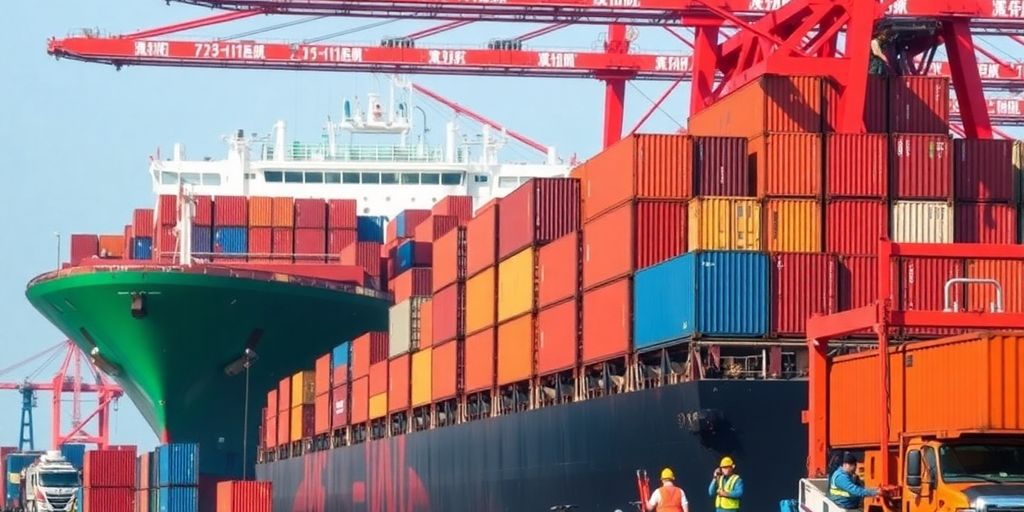So, you’re thinking about shipping stuff from China, and you’ve come across the term FOB. What does it mean, and why should you care? Well, FOB, or Free On Board, is a shipping term that can make a big difference in how you handle your imports. It tells you when the responsibility and cost of shipping transfer from the seller to you, the buyer. Understanding FOB China can help you avoid unexpected costs and make the shipping process smoother. Let’s dive into the key takeaways to get a better grip on this important shipping term.
Основные выводы
- FOB China means the seller handles costs until the goods are on the ship.
- Once the goods are on board, the buyer takes over all risks and costs.
- FOB is only for sea shipments, not air or land.
- Buyers need to arrange for freight and insurance after the goods are on the ship.
- FOB can be cost-effective but requires careful coordination with suppliers.
Understanding FOB China: Key Concepts and Definitions
What Does FOB Mean in Shipping Terms?
FOB, or Free On Board, is a common term in international shipping that defines the point at which the responsibility and risk for goods transfer from the seller to the buyer. In a typical FOB agreement, the seller is responsible for the goods until they are loaded onto a shipping vessel at the designated port. Once the goods are on board, the buyer assumes responsibility for transportation costs and risks.
- Seller’s Responsibilities:
- Buyer’s Responsibilities:
FOB Origin vs. FOB Destination
The terms "FOB Origin" and "FOB Destination" clarify when the transfer of risk occurs:
- FOB Origin: The buyer assumes risk and responsibility once the goods leave the seller’s location. This means the buyer is liable for any damage or loss during transit from the seller’s premises.
- FOB Destination: The seller retains risk until the goods arrive at the buyer’s specified location. The seller is responsible for any issues that arise during shipment.
The Role of Incoterms in FOB Agreements
Incoterms, short for International Commercial Terms, are a set of predefined commercial terms published by the International Chamber of Commerce (ICC). They are essential for international trade, providing clarity on the division of responsibilities between buyers and sellers. In the context of FOB, Incoterms specify who is responsible for shipping costs, risk, and handling at each stage of the shipping process.
Incoterms like FOB are vital for ensuring smooth transactions in international shipping. They help parties understand their obligations and reduce potential disputes over shipping responsibilities.
For anyone dealing with international trade, understanding Incoterms, such as FOB, is crucial for effective logistics and trade management.
The FOB China Shipping Process: Step-by-Step Guide
Requesting a Product Quotation
Getting a product quote is your first step in the FOB China shipping process. Most factories in China will provide quotations under FOB Incoterms. This means they include costs up to the port of shipment. Typically, you’ll see a unit price, the Incoterm (FOB), and a specific Chinese city. This city is the port where your goods will be shipped from. If you need to change the port, be ready to discuss this with your supplier, as it might affect the price.
Confirming the Shipment
After you receive a satisfactory quotation, it’s time to confirm your shipment. Inform your logistics company that you’re ready to proceed. They’ll typically send over some paperwork for you to sign, confirming that you want them to handle the shipment. Once everything is set, they will book space on a ship for your cargo. Make sure all details are correct and any missing info is confirmed.
Shipping Day Procedures
On the big day, your logistics company and the seller’s warehouse will arrange for a truck to pick up your goods. If you’re shipping a full container load (FCL), the truck will bring the container directly to the seller’s warehouse for loading. For less than container load (LCL), your goods will go to a warehouse first, where they’ll be combined with other shipments. Once loaded, your cargo heads to the port, gets weighed, and the export process kicks off. It’s crucial to communicate clearly with your forwarder and supplier to avoid any last-minute hiccups.
Cost Factors in FOB China Agreements

Understanding FOB Pricing
FOB, or Free on Board, pricing is a common term used in international trade. This means the seller covers all costs up to the point where the goods are loaded onto a ship. Once the goods are on board, the buyer takes over, assuming responsibility and costs. This includes shipping, insurance, and any handling fees from that point forward. In essence, FOB pricing allows buyers to see exactly what they are paying for up to the departure port, making it easier to compare costs across suppliers.
Who Pays Freight for FOB Shipments?
In an FOB agreement, the buyer is responsible for paying the freight costs from the port of origin to the final destination. This can be a significant amount, especially for long-distance shipments. Buyers also need to arrange and pay for insurance, although it’s not a strict requirement under FOB terms. Here’s a quick rundown of what the buyer typically covers:
- Freight charges from the port of origin to destination.
- Insurance, if chosen.
- Destination terminal handling charges.
- Final delivery to the buyer’s location.
The Difference Between FOB and CIF
FOB and CIF (Cost, Insurance, and Freight) are both common shipping terms, but they have key differences. With CIF, the seller covers the cost of shipping and insurance until the goods reach the buyer’s port of destination. This often results in higher prices for the buyer, as the seller includes these costs in the product price. In contrast, FOB requires the buyer to handle these expenses, offering more control over shipping logistics and potentially lower costs if the buyer can negotiate better shipping rates.
When choosing between FOB and CIF, consider your control over shipping and costs. FOB might be more appealing if you have reliable logistics partners who can manage the transportation efficiently. However, if you prefer a more hands-off approach, CIF could be the way to go.
Additionally, shipping costs from China to the US can vary widely, so it’s wise to shop around for the best rates. Understanding these differences can lead to significant savings and smoother transactions.
When to Use FOB Agreements for Shipping from China

Ideal Scenarios for FOB Use
FOB, or Free On Board, is a popular choice for shipping goods from China, especially when dealing with bulk cargo that travels by sea. This term is particularly well-suited for maritime transport, where the buyer takes responsibility once the goods are loaded onto the vessel. Here are some scenarios where FOB agreements shine:
- When the buyer has a reliable freight forwarder to handle logistics.
- If the buyer prefers to control the shipping process after the goods are loaded.
- When shipping large quantities that make sea freight economical.
Comparing FOB with Other Incoterms
FOB is just one of many Incoterms, and understanding the differences can help in selecting the right one for your needs. Here’s a quick comparison:
| Incoterm | Mode of Transport | Responsibility Transfer Point |
|---|---|---|
| FOB | Sea | When goods are on board |
| FCA | Any | When goods are handed to carrier |
| CIF | Sea | When goods reach destination port |
For shipments not by sea, consider using FCA, which covers all transport modes. Meanwhile, CIF might be more suitable if you want the seller to handle shipping and insurance.
The Role of Freight Forwarders
Freight forwarders play a crucial role in FOB agreements. They manage the logistics, ensuring that the shipping process runs smoothly. Here’s why they’re important:
- Expertise in Handling Paperwork: They know the ins and outs of customs documentation and shipping regulations.
- Экономическая эффективность: They can negotiate better rates for shipping and insurance.
- Problem Solving: In case of delays or issues, they can quickly find solutions to keep your shipment on track.
Working with a freight forwarder can ease the complexities of international shipping, making FOB a more attractive option for many buyers.
Advantages and Disadvantages of FOB China

Benefits of Using FOB
FOB, or Free on Board, is popular for a reason. It gives buyers more control over their shipping process and costs. Buyers can choose their own freight forwarders, negotiate better shipping rates, and decide on the best routes for their goods. This means they can potentially save a lot of money. Sellers also benefit because once the goods leave their warehouse, their responsibility ends. They can focus on their core business without worrying about the shipping logistics.
- Buyers manage their shipping and can shop for the best deals.
- Sellers transfer shipping responsibilities and can finalize sales quickly.
- Both parties have clear roles, reducing the chance of disputes.
Potential Drawbacks of FOB Agreements
However, FOB isn’t without its challenges. For buyers, especially those new to international shipping, handling all logistics can be overwhelming. They’re responsible for everything from arranging transportation to managing customs clearance and insurance. If anything goes wrong during transit, the buyer has to deal with it. For sellers, while FOB frees them from shipping duties, it means they lose control over the goods once they leave the port. This could impact their reputation if the buyer faces issues.
- Buyers take on all risks once goods are loaded onto the shipping vessel.
- New buyers might find the logistics management complex and risky.
- Sellers might face reputation issues if buyers encounter shipping problems.
FOB vs. Other Shipping Terms
When comparing FOB to other shipping terms like CIF (Cost, Insurance, and Freight) or FAS, FOB stands out by offering buyers more control and potentially lower costs. With CIF, sellers handle shipping and insurance, which could mean higher prices for buyers. On the other hand, FAS allows sellers to minimize costs by transferring responsibility to buyers once goods reach the port. FOB strikes a balance, offering flexibility and control to buyers while simplifying logistics for sellers.
- FOB gives control to buyers, unlike CIF, which includes insurance and higher costs.
- FAS transfers responsibility at the port, offering another option for cost-conscious sellers.
- Choosing the right term depends on the needs and experience of both parties.
FOB China is a versatile shipping term, offering both buyers and sellers distinct advantages. While it demands a greater understanding of logistics from buyers, the potential savings and control make it a preferred choice for many. Sellers enjoy the simplicity of transferring responsibility once goods leave their hands, allowing them to focus on production and sales.
Common Misconceptions About FOB China
FOB is Only for Sea Shipments
A widespread misunderstanding about FOB (Free On Board) is that it’s exclusively for sea shipments. While FOB is indeed tailored for sea and inland waterway transport, it doesn’t mean it’s the only option for international shipping. For instance, if you’re considering other modes like air or rail, the FCA (Free Carrier) term might be more suitable. The FOB shipping term is specific about its use, and understanding this can prevent logistical hiccups.
FOB Does Not Include Insurance
Another common myth is that FOB agreements automatically cover insurance, but that’s not the case. Typically, the responsibility for insurance falls on the buyer, unless otherwise negotiated. It’s a good idea for either party to arrange insurance to protect their interests. Remember, the FOB price generally includes the cost up to the port of shipment, not beyond, so insurance is a separate consideration.
Clarifying FOB Responsibilities
Many assume the seller’s responsibilities end once goods leave their premises, which is not entirely accurate. In reality, the seller remains responsible until the goods are loaded onto the vessel. This distinction is crucial for understanding the responsibilities in shipping. Misunderstanding this can lead to disputes over who bears the risk during certain stages of the shipping process.
FOB terms can be tricky, but getting a clear grip on them can save you from unexpected costs and confusion. Always clarify terms and responsibilities upfront to avoid surprises later.
Legal Considerations in FOB China Transactions

Governing Laws for FOB Agreements
Когда речь идет о FOB terms, it’s important to know that rules can vary depending on the country. The International Chamber of Commerce (ICC) sets out widely recognized guidelines, but local laws might also apply. Always specify which legal framework governs your agreement to avoid misunderstandings.
Customs and Import Duties
Когда вы импорт из Китая, be prepared to handle customs clearance and import duties. In FOB contracts, the buyer usually takes on these responsibilities once the goods leave the seller’s location. This means you need to be ready with all necessary documents to prevent delays and additional costs.
Insurance Requirements
Insurance is a tricky part of FOB deals. Typically, the buyer arranges and pays for insurance once the goods are on board the ship. It’s crucial to ensure that the coverage is adequate for the journey to protect against potential losses.
Tip: Double-check your insurance policy to make sure it covers all risks from the point the goods are loaded onto the vessel.
In summary, understanding the legal aspects of FOB transactions can help prevent costly mistakes and ensure a smoother shipping process.
Practical Tips for Managing FOB Shipments from China
Working with Chinese Suppliers
When dealing with Chinese suppliers, it’s crucial to maintain clear and open communication. Always confirm all details of the shipment in writing to avoid any misunderstandings. Make sure you know who is responsible for what part of the shipping process. Suppliers might provide a quote using FOB terms, which includes costs up to the point the goods are loaded onto the ship. If you need to change the port of export, discuss this with your supplier early to adjust prices accordingly.
Coordinating with Logistics Companies
Choosing the right logistics company can make or break your shipping experience. It’s wise to get expert advice when selecting a logistics partner, especially if you’re new to importing. These companies can help you navigate the complexities of shipping and customs. A good logistics company will also assist in coordinating pickup and delivery, ensuring your goods reach their destination efficiently.
Ensuring Smooth Shipping Operations
To ensure a smooth shipping process, plan ahead and allow ample time for shipping and customs clearance. This can prevent the need for expensive expedited shipping options. Additionally, consider shipping during off-peak periods to reduce costs. It’s also beneficial to work with freight forwarders who can negotiate better rates and handle the intricacies of shipping from China. While sea freight is often preferred, it comes with its own set of challenges, so be prepared for potential delays and plan accordingly.
Remember, the key to successful FOB shipping is preparation and communication. By staying informed and organized, you can minimize risks and ensure your goods arrive on time and in good condition.
Managing shipments from China can be tricky, but with the right tips, you can make it easier. Start by keeping track of your orders and communicating clearly with your suppliers. Always check the quality of your products before they leave the factory. If you need help, visit our website for more resources and support!
Wrapping It Up: FOB China in a Nutshell
So, there you have it. Navigating FOB shipping from China might seem a bit overwhelming at first, but once you get the hang of it, it’s pretty straightforward. The key is understanding the terms and knowing what each party is responsible for. Whether you’re a seasoned importer or just starting out, FOB offers a flexible and often cost-effective way to manage your shipments. Just remember, the seller handles everything until your goods are on the ship, and then it’s all on you. Make sure to get those quotes, understand the costs, and maybe even work with a logistics company if you’re new to the game. With a bit of planning and the right partners, your products will be on their way to you in no time. Happy shipping!
Часто задаваемые вопросы
What is FOB pricing?
FOB pricing means the seller includes the cost of getting the goods to the port and loading them on the ship. Once the goods are on the ship, the buyer takes over responsibility.
Who pays for shipping in FOB agreements?
In FOB terms, the buyer is usually responsible for the shipping costs once the goods are on the ship.
How is FOB different from CIF?
FOB means the buyer pays for shipping and takes responsibility once goods are on the ship. CIF means the seller pays for shipping and insurance until the goods reach the buyer’s country.
Is insurance needed for FOB shipments?
Insurance isn’t required for FOB shipments, but it’s a good idea for either the buyer or seller to have it, just in case.
What does FOB mean in shipping?
FOB stands for ‘Free on Board.’ It means the seller’s job is to get the goods on the ship, and then the buyer takes over.
Can FOB be used for air shipments?
No, FOB is mainly used for sea shipments. For air or other transport, different terms like FCA might be better.





